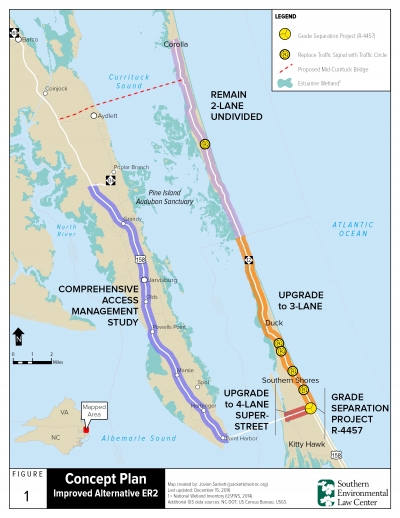Locals, SELC advance alternative to unneeded new bridge in Currituck
As the state continues to consider how to address peak summer congestion in the Northern Outer Banks, SELC, local group “No MCB”, and the North Carolina Wildlife Federation are advocating for lower impact solutions. This week, as part of comments submitted to the state, the three groups shared a lower cost, less damaging alternative to the North Carolina Department of Transportation’s $600 million Mid-Currituck Bridge project.
The costly and environmentally harmful proposed bridge would cross the sensitive Currituck Sound between North Carolina’s mainland Currituck County and Corolla on the Outer Banks.

Midcurrituck Bridge Alternative
Residents of those areas and other stakeholders, who wrestle annually with beach traffic, provided consultation and suggestions for the alternative solution, which was developed under the guidance of transportation expert Walter Kulash.
The proposal includes physical changes to the transportation network, such as minimal road widening along key congested stretches of NC 12, a redesigned interchange between NC 12 and 158, and the conversion of signalized intersections to roundabouts.
The proposal also includes programs designed to reduce transportation demand, such as incentivizing staggered check-out days at vacation rental homes, and an “electronic key” program that would eliminate unnecessary trips to centralized vacation rental offices.
The alternative solution was designed to ease peak congestion days, which occur primarily on summer weekends, at a minimal cost to taxpayers and the environment. This approach also could be implemented much sooner than the proposed bridge.
By contrast, NCDOT has been unable to present a viable financial plan for the $600 million bridge. This fall, NCDOT’s own analysis showed a drop in long-term traffic expectations. Less traffic would mean less toll revenue, which the state is relying on as a primary means of financing the pricey project.
SELC and their partners are hopeful that NCDOT will take a fresh look at the Northern Outer Banks’ transportation challenges and implement a fiscally and environmentally responsible solution.
